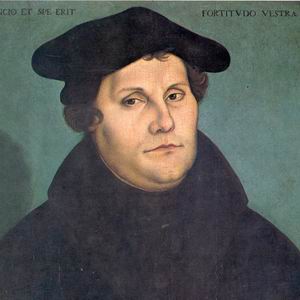The Impact of Martin Luther and the Reformation on Modern Revivalism
Luther Learns the Power of God’s Word
 It was the power of God’s word, and the revelation therein, of being made righteous before God through faith in Jesus that brought Luther into a place of peace with God. Romans 1:17 convinced him that only through faith in Christ could a person become just before God and find peace in their soul. This was revolutionary, for the church taught that one was saved through submission to the church and by receiving the sacraments from an ordained priesthood. The mystics, who were generally loyal to the institutional church and its doctrines, taught that one could only find peace with God through a mystical union of the soul with God obtained through a series of religious exercises and intense suffering.
It was the power of God’s word, and the revelation therein, of being made righteous before God through faith in Jesus that brought Luther into a place of peace with God. Romans 1:17 convinced him that only through faith in Christ could a person become just before God and find peace in their soul. This was revolutionary, for the church taught that one was saved through submission to the church and by receiving the sacraments from an ordained priesthood. The mystics, who were generally loyal to the institutional church and its doctrines, taught that one could only find peace with God through a mystical union of the soul with God obtained through a series of religious exercises and intense suffering.
Luther, being also the parish priest in Wittenberg, preached these revolutionary doctrines of salvation through faith alone from the pulpit as well as in the classroom. It was not long before his sermons were being printed and distributed throughout Germany, arousing great interest among the masses and great consternation with church officials. Ordered by his superiors to stop preaching and publishing these “heretical” doctrines, Luther had to decide if he would obey God or man. By now it was clear to him that his source of authority was the word of God and that he must preach it even if the devil and all the world opposed him.
When he continued to preach and teach the truths he had learned from Scripture, he received notice from Rome of his excommunication and an order that all his books and tracts be confiscated and burned. He was later condemned as a heretic at the Diet of Worms and anyone knowing his whereabouts was instructed to inform the nearest authorities so that he could be apprehended.
Luther’s writings, however, gained such popularity with the masses that neither pope or emperor dared to try and apprehend him. Later in life, in explaining how he was able to succeed against such formidable opposition, Luther credited his success to the power of God’s word. He said,
I only urged, preached, and declared God’s Word, nothing else. And yet while I was asleep, the Word inflicted greater injury on popery than prince or emperor ever did. I did nothing; the Word did everything.1
Confronting An Errant Spirituality With Scripture
Luther confronted, not only erroneous doctrine and the church hierarchy with Scripture, but also an errant spirituality that had become divorced from Scripture. While Luther was hiding in the Castle of Wartburg after his condemnation at the Diet of Worms, two individuals from Zwickau, known as the Zwickau Prophets, came to Wittenberg claiming to have had divine visions, dreams, and visits from the angel Gabriel. They wowed the people with their revelations and began taking the reform movement in Wittenberg in a radical direction that was not compatible with Scripture. Melanchthon and Luther’s other colleagues were unable to stop them.
Category: Church History, Summer 2009


